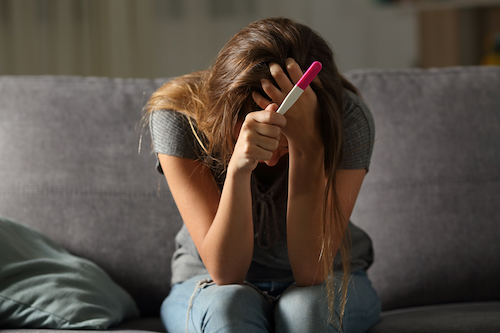 When it comes to pregnancy and childbirth, there can be a lot to worry about. Whether it be the fear of contractions and pain, worries about interventions or length of labour, some fear and anxiety surrounding pregnancy and childbirth is normal.
When it comes to pregnancy and childbirth, there can be a lot to worry about. Whether it be the fear of contractions and pain, worries about interventions or length of labour, some fear and anxiety surrounding pregnancy and childbirth is normal.
But for some women, this fear can be overpowering, and even impact day-to-day life. A fear of pregnancy and childbirth this strong is known as tokophobia, and experts say it has gone unnoticed for too long.
“Research suggests that tokophobia can have debilitating effects on women and their families. Some women will avoid pregnancy, even though they might want to have children. For those who do become pregnant, the condition can overshadow pregnancy and affect the choices they make for labour and birth,” Catriona Jones, a Senior Research Fellow in Maternal and Reproductive Health at the University of Hull in England told Theravive.
The exact prevalence of tokophobia is unknown. Some studies suggest rates of 20 per cent in the western world. One Australian study put the number much higher at 48 per cent for moderate tokophobia and 26 per cent for mild tokophobia.
There are different measures that can be used to determine if a woman has tokophobia. If a woman scores above 60 on the Fear of Birth Scale, Jones says that suggests she would need more help and support.
“When we have tried to define the cut off between normal fear and problematic fear in our work, we have used the language of “a fear of childbirth that affects daily functioning and negatively impacts upon pregnancy” is known as tokophobia. This might be useful in understanding when it becomes problematic,” Jones said.
Tokophobia can appear in any female, though those who experience the condition are more likely to experience anxiety or depression. Women experiencing the condition may avoid pregnancy completely, or if they do fall pregnant, consider a termination or request a c-section due to fear of childbirth.
Those experiencing severe tokophobia are more at risk of severe anxiety or depression and post-traumatic stress disorder. For women with tokophobia who are pregnant, these feelings may intensify as the pregnancy progresses. The closer a woman gets to delivery, the more likely she is to experience an increase in anxious thoughts. Risk of suicide and self harm also increases the closer a woman with tokophobia gets to birth.
Jones says negative stories of birth in the media and online may be playing a role in women developing tokophobia.
“From looking at some of the fear of childbirth literature, we suggested that the birth media in general, both mainstream and social, that women are exposed to, may be playing a part in setting birth up as a negative experience,” she said.
But Jones says this doesn’t mean women should stop sharing their birth stories either online or through the press.
“It is not advisable that women stop sharing their birth stories, and like-minded peer support mechanisms, including the use of parenting forums, have been found to be extremely helpful for women who experience a range of perinatal mental health problems including fear of birth and post-traumatic stress disorder, but clearly, there is a tension here, the question being - how do you meet the needs of both groups of women? Those who want to tell their stories and find it helpful and cathartic and those who, as we know from the evidence, become more fearful as a consequence of reading and hearing them,” she said.
As well as risks to the mother, tokophobia can also result in risks for the fetus or baby. Pregnancies may be terminated out of fear, mothers may have difficulties bonding and forming attachments with their babies and anxieties in pregnancies can have a longer term negative impact on a child’s emotional and developmental outcomes.
Jones says a common misconception is that tokophobia is the reasoning behind a rise in births by ceaserean sections, but she argues there is no data supporting this. She says if a woman is experiencing significant fear or anxiety about childbirth she should be referred to health care professionals who specialise in perinatal mental health. Such professionals would then be able to assist the woman in addressing her fear and where possible help a woman to mentally prepare herself for giving birth vaginally.
Jones says preparing a woman with a fear of childbirth to give birth vaginally can take time, and tokophobia isn’t always identified early enough so something can be done.
“A significant number of referrals are made later in the pregnancy, with very limited time given to the work of the specialist services to make any meaningful differences to the women’s condition,” she said.
Jones hopes that as awareness around tokophobia grows, so to will treatment options for women experiencing the condition. She says that starts with providing better support for women with and without the condition.
“By providing better care for all women, we can diminish the chances of women developing tokophobia after their first birth and also the amount of negative birthing stories that women are sharing.”
Elizabeth Pratt is a medical journalist and producer. Her work has appeared on Healthline, The Huffington Post, Fox News, The Australian Broadcasting Corporation, The Sydney Morning Herald, News.com.au, Escape, The Cusp and Skyscanner. You can read more of her articles here. Or learn more about Elizabeth and contact her via her LinkedIn and Twitter profiles.